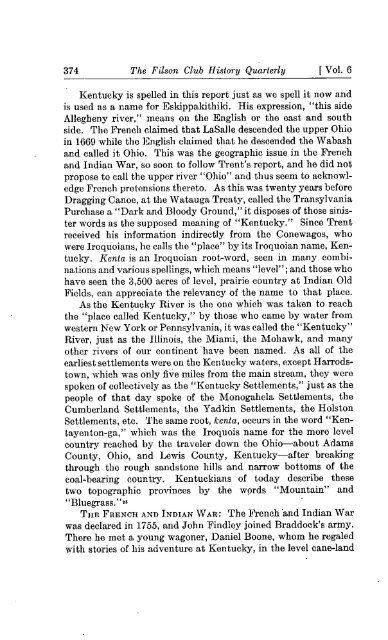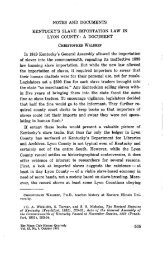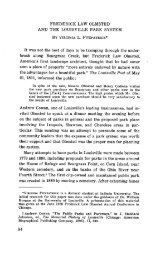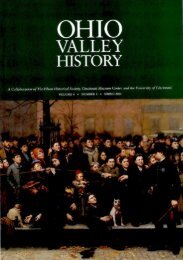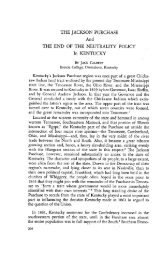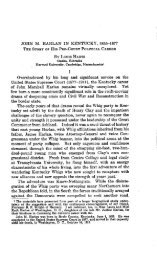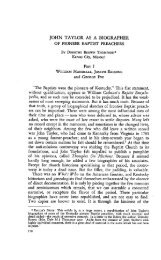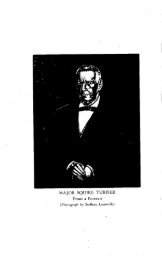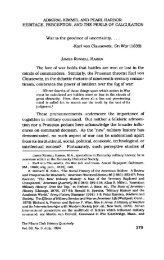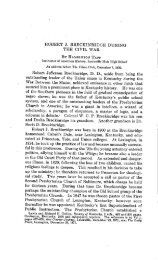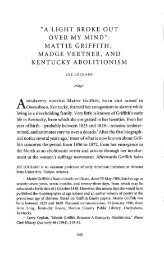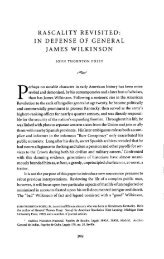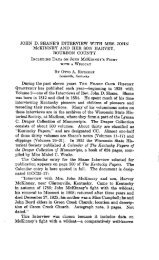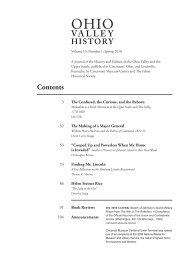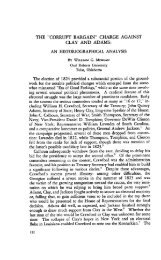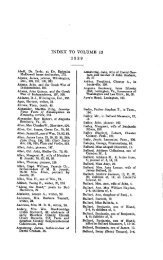Eskippakithiki, The Last Indian Town in Kentucky - The Filson ...
Eskippakithiki, The Last Indian Town in Kentucky - The Filson ...
Eskippakithiki, The Last Indian Town in Kentucky - The Filson ...
Create successful ePaper yourself
Turn your PDF publications into a flip-book with our unique Google optimized e-Paper software.
374 <strong>The</strong> <strong>Filson</strong> Club History Quarterly [ Vol. 6<br />
<strong>Kentucky</strong> is spelled <strong>in</strong> this report just as we spell it now and<br />
is used as a name for <strong>Eskippakithiki</strong>. His expression, "this side<br />
Allegheny river," means on the English or the east and south<br />
side. <strong>The</strong> l'."reneh claimed that LaSalle descended the upper Ohio<br />
<strong>in</strong> 1669 while the English claimed that he descended the Wabash<br />
and called it Ohio. This was the geographic issue <strong>in</strong> the French<br />
and <strong>Indian</strong> War, so soon to follow Trent's report, and he did not<br />
propose to call the upper river "Ohio" and thus seem to acknowledge<br />
French pretensions thereto. As this was twenty years before<br />
Dragg<strong>in</strong>g Canoe, at the Watauga Treaty, called the Transylvania<br />
Purchase a "Dark and Bloody Ground," it disposes of those s<strong>in</strong>ister<br />
words as the supposed mean<strong>in</strong>g of "<strong>Kentucky</strong>." S<strong>in</strong>ce Trent<br />
received his <strong>in</strong>formation <strong>in</strong>directly from the Conewagos, who<br />
were Iroquoians, he calls the "place" by its Iroquoian name, KentuckT.<br />
Kenta is an Iroquoian root-word, seen <strong>in</strong> many comb<strong>in</strong>ations<br />
and various spell<strong>in</strong>gs, which means "level"; and those who<br />
have seen the 3,500 acres of level, prairie country at <strong>Indian</strong> Old<br />
Fields, can appreciate the relevancy of the name to that place.<br />
As the <strong>Kentucky</strong> River is the one which was taken to reach<br />
the "place called <strong>Kentucky</strong>," by those who came by water from<br />
western New York or Pennsylvania, it was called the "<strong>Kentucky</strong>"<br />
River, just as the Ill<strong>in</strong>ois, the Miami, the Mohawk, and many<br />
other rivers of our cont<strong>in</strong>ent have been named. As all of the<br />
earliest settlements were on the <strong>Kentucky</strong> waters, except Harrodstown,<br />
which was only five miles from the ma<strong>in</strong> stream, they were<br />
spoken of collectively as the "<strong>Kentucky</strong> Settlements," just as the<br />
people of that day spoke of the Monogahela Settlements, the<br />
Cumberland Settlements, the Yadk<strong>in</strong> Settlements, the Holston<br />
Settlements, etc. <strong>The</strong> same root, kenta, occurs <strong>in</strong> the word "Kentayenton-ga,"<br />
which was the Iroquois name for the more level<br />
country reached by the traveler down the Ohio--about Adams<br />
County, Ohio, and Lewis County, <strong>Kentucky</strong>--after break<strong>in</strong>g<br />
through the rough sandstone hills and narrow bottoms of the<br />
coal-bear<strong>in</strong>g country. Kentuckians of today describe these<br />
two topographic proxdnces by the words "Mounta<strong>in</strong>" and<br />
"Bluegrass."-<br />
THE FRENCH AND INDIAN WAR: <strong>The</strong> French 'and <strong>Indian</strong> War<br />
was declared <strong>in</strong> 1755, and John F<strong>in</strong>dley jo<strong>in</strong>ed Braddock's army.<br />
<strong>The</strong>re he met a young wagoner, Daniel Boone, whom he regaled<br />
with stories of his adventure at <strong>Kentucky</strong>, <strong>in</strong> the level cane-land


